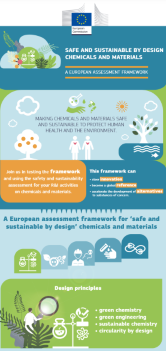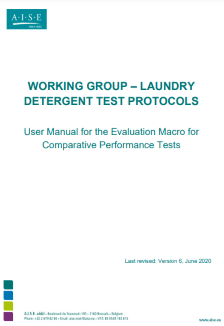Embodying the principles of ‘safe and sustainable by design’ (SSbD) is one of the ambitions of the EU Chemicals Strategy for Sustainability (CSS). It is an inherent part of the zero-pollution objective of the Green Deal, with the aim of prioritising the safety or users and the environment, while boosting innovation for safe and sustainable chemicals from the design phase of a product right throughout its lifecycle.
Ecodesign for sustainable products
The proposed Ecodesign Regulation for Sustainable Products (ESPR) was put forward by the European Commission in 2022. It will enable the development of a comprehensive and harmonised set of requirements for the sustainability of products placed on the EU market, and as such will drive consumer choice and green public procurement. The proposal for a Regulation is a revision of the Ecodesign Directive.
A.I.S.E.’s position
A.I.S.E. has been at the forefront of driving sustainability for many years through the A.I.S.E. Charter for Sustainable Cleaning which supports our whole industry to undertake continual sustainability improvements and encourages consumers to adopt more sustainable habits. The Charter has a proven track record of delivering tangible and measurable improvements in environmental performance, both for products and manufacturing processes.
A.I.S.E. welcomes the objectives of ESPR. We believe the proposal currently under review can be strengthened in a number of ways.
- The use of other verifiable Life Cycle Assessment (LCA) methods for quantification of environmental impacts in addition to the Product Environmental Footprint (PEF) methodology. Current PEF rules have limitations, and other methodologies should be considered.
- Clear definition of substances of concern that is fit for the purpose of sustainable products
- Harmonisation of ecodesign and information requirements at EU level
- Keeping self-regulation as an option to meet ESPR requirements
- Limiting use of fossil-based resources and supporting the use of sustainably sourced low carbon renewable and circular resources.
A Digital Product Passport (DPP) is proposed as part of ESPR, which would gather product related data through a unique identifier that relates to varied aspects of sustainability and environmental impact of a product.
Safe & sustainable by design
Safe and sustainable by design (SSbD) is a guidance framework published by the European Commission in 2022 that intends to go beyond the current regulatory compliance, and its scope covers chemicals and mixtures. A.I.S.E.’s Charter for Sustainable Cleaning is referenced in the Commission’s Framework as part of the review of safety and sustainability methods.

The Framework seeks to steer innovation towards green industrial transition and provide guidance on the development of criteria for the design of safe and sustainable chemicals and materials.
It aims to drive innovation towards substitution or minimisation of production and use of substances of concern, in line with and beyond upcoming regulatory obligations. It also seeks to minimise impact on human health, climate and the environment along the entire life cycle.
A.I.S.E.’s position
A.I.S.E. supports integrating risk assessment and safety-based considerations with lifecycle- based approaches to ensure sustainability right along the value chain. We urge that the framework assesses the sustainability of the use of a chemical or material in the final application – e.g. where it is used as part of, or as an ingredient in, a product. In addition, it is crucial to acknowledge that a product’s sustainability profile encompasses various aspects beyond its mere ingredients or components, all of which demand consideration and evaluation.




